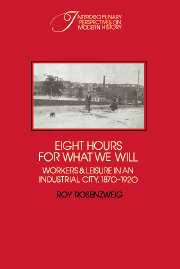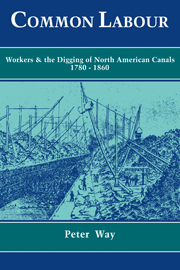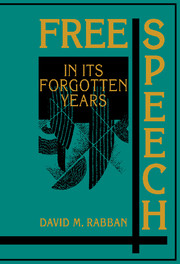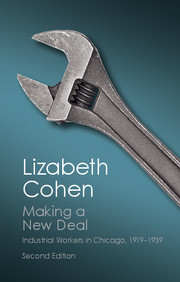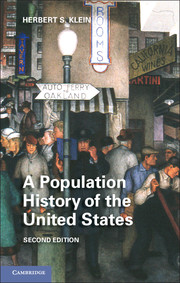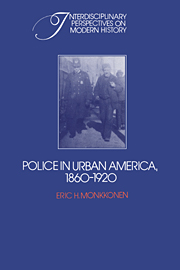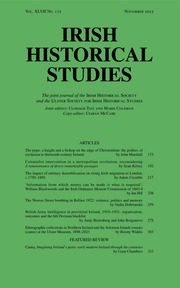Eight Hours for What We Will
Workers and Leisure in an Industrial City, 1870–1920
$39.99 (G)
Part of Interdisciplinary Perspectives on Modern History
- Author: Roy Rosenzweig
- Date Published: October 1985
- availability: Available
- format: Paperback
- isbn: 9780521313971
$
39.99
(G)
Paperback
Looking for an examination copy?
This title is not currently available for examination. However, if you are interested in the title for your course we can consider offering an examination copy. To register your interest please contact [email protected] providing details of the course you are teaching.
-
In the first comprehensive study of American working-class recreation, Professor Rosenzweig takes us to the saloons, the ethnic and church picnics, the parks and playgrounds, the amusement parks, and the movie houses where industrial workers spent their leisure hours. Focusing on the city of Worcester, Massachusetts, he describes the profound changes that popular leisure underwent. Explaining what these pastimes and amusements tell us about the nature of working-class culture and class relations in this era, he demonstrates that in order fully to understand the working class experience it is necessary to explore the realm of leisure. For what workers did in the corner saloon, the neighbourhood park, the fraternal lodge hall, the amusement park, and the nickelodeon had a good deal of bearing on what happened inside the factories, the union halls, and the voting booths of America's industrial communities.
Reviews & endorsements
'In the proliferating scholarship on American working-class history, leisure has been among the last themes to be taken up. Thus, the appearance of Roy Rosenzweig's book is especially to be welcomed. It is an admirable study on several counts. For one thing, it fully exploits the advantages of local history … His exhaustive research has yielded rich materials, anabling him, for example, to show the changing composition of Worcester's saloonkeepers and to chart the opening history of the city's movie houses … especially impressive is his subtle assessment of the impact of the movies on Worcester's working people.' David Brody, Journal of American History
See more reviews'Eight Hours For What We Will is a major contribution to modern American working-class history and to the history of a changing American popular and mass culture.' Herbert Gutman, Distinguished Professor of History, City University of New York
'This is conceptually a very innovative and important book.' Thomas A. McMullin, Historical Journal of Massachusetts
'Rosenzweig provides a fascinating study of the interplay of class, ethnicity, and economics in shaping the leisure culture of Worcester's working class.' Mark Aldrich, The Journal of Economic History
Customer reviews
Not yet reviewed
Be the first to review
Review was not posted due to profanity
×Product details
- Date Published: October 1985
- format: Paperback
- isbn: 9780521313971
- length: 320 pages
- dimensions: 228 x 134 x 23 mm
- weight: 0.479kg
- availability: Available
Table of Contents
Acknowledgments
Introduction
Part I. Context:
1. Workers in an industrial city, 1870–1920
Part II. Culture: The Working-Class World of the Late Nineteenth-Century:
2. The rise of the saloon
3. Immigrant workers and the fourth of july
Part III. Conflict: Struggles Over Working-Class Leisure in the Late Nineteenth and Early Twentieth Centuries:
4. The struggle over the saloon, 1870–1910
5. The struggle over recreational space: the development of parks and playgrounds
6. The struggle over the fourth: the safe and sane july fourth movement and the immigrant working class
Part IV. Culture, Conflict, and Change: The Working-Class World of the Early Twentieth Century:
7. The commercialization of leisure: the rise of a leisure market and the persistence of the saloon
8. From rum shop to Rialto: workers and movies
Conclusion
Abbreviations used in notes
Notes
A note on sources
Index.
Sorry, this resource is locked
Please register or sign in to request access. If you are having problems accessing these resources please email [email protected]
Register Sign in» Proceed
You are now leaving the Cambridge University Press website. Your eBook purchase and download will be completed by our partner www.ebooks.com. Please see the permission section of the www.ebooks.com catalogue page for details of the print & copy limits on our eBooks.
Continue ×Are you sure you want to delete your account?
This cannot be undone.
Thank you for your feedback which will help us improve our service.
If you requested a response, we will make sure to get back to you shortly.
×
